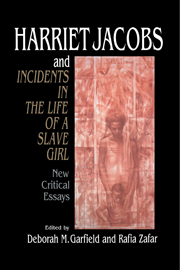Book contents
- Frontmatter
- Contents
- Introduction: Over-exposed, Under-exposed: Harriet Jacobs and Incidents in the Life of a Slave Girl
- “I Disguised My Hand”: Writing Versions of the Truth in Harriet Jacobs's Incidents in the life of a Slave Girl and John Jacobs's “A True Tale of Slavery”
- Through Her Brother's Eyes: Incidents and “A True Tale”
- Resisting Incidents
- Manifest in Signs: The Politics of Sex and Representation in Incidents in the life of a Slave Girl
- Earwitness: Female Abolitionism, Sexuality, and Incidents in the life of a Slave Girl
- Reading and Redemption in Incidents in the Life of a Slave Girl
- Harriet Jacobs, Frederick Douglass, and the Slavery Debate: Bondage, Family, and the Discourse of Domesticity
- Motherhood Beyond the Gate: Jacobs's Epistemic Challenge in Incidents in the Life of a Slave Girl
- “This Poisonous System”: Social Ills, Bodily Ills, and Incidents in the Life of a Slave Girl
- Carnival Laughter: Resistance in Incidents
- Harriet Jacobs, Henry Thoreau, and the Character of Disobedience
- The Tender of Memory: Restructuring Value in Harriet Jacobs's Incidents in the Life of a Slave Girl
- Conclusion: Vexed Alliances: Race and Female Collaborations in the Life of Harriet Jacobs
- List of Contributors
- Index
- CAMBRIDGE STUDIES IN AMERICAN LITERATURE AND CULTURE
Resisting Incidents
Published online by Cambridge University Press: 22 January 2010
- Frontmatter
- Contents
- Introduction: Over-exposed, Under-exposed: Harriet Jacobs and Incidents in the Life of a Slave Girl
- “I Disguised My Hand”: Writing Versions of the Truth in Harriet Jacobs's Incidents in the life of a Slave Girl and John Jacobs's “A True Tale of Slavery”
- Through Her Brother's Eyes: Incidents and “A True Tale”
- Resisting Incidents
- Manifest in Signs: The Politics of Sex and Representation in Incidents in the life of a Slave Girl
- Earwitness: Female Abolitionism, Sexuality, and Incidents in the life of a Slave Girl
- Reading and Redemption in Incidents in the Life of a Slave Girl
- Harriet Jacobs, Frederick Douglass, and the Slavery Debate: Bondage, Family, and the Discourse of Domesticity
- Motherhood Beyond the Gate: Jacobs's Epistemic Challenge in Incidents in the Life of a Slave Girl
- “This Poisonous System”: Social Ills, Bodily Ills, and Incidents in the Life of a Slave Girl
- Carnival Laughter: Resistance in Incidents
- Harriet Jacobs, Henry Thoreau, and the Character of Disobedience
- The Tender of Memory: Restructuring Value in Harriet Jacobs's Incidents in the Life of a Slave Girl
- Conclusion: Vexed Alliances: Race and Female Collaborations in the Life of Harriet Jacobs
- List of Contributors
- Index
- CAMBRIDGE STUDIES IN AMERICAN LITERATURE AND CULTURE
Summary
Particular communicative contexts seem inevitably to trigger resistance. When a writer or narrator is different in race, gender, or class from the implied or actual reader, questions about authority and authenticity multiply. As Susan Lanser points out in The Narrative Act, a writer's or a narrator's social identity is never totally irrelevant, but readers automatically assume that the “unmarked” narrator is a literate white male. When the title page, the book jacket, or any other source marks one as not white, not a man, or not to the manor born, different sets of cultural assumptions “determined by the ideological system and the norms of social dominance in a given society” (Lanser, 166) come into play. When the topic or the general development of the text coincides thematically with the readers' assumptions about the writer's or narrator's social identity, status becomes particularly significant to the discursive context. “Social identity and textual behavior,” Lanser concludes, “combine to provide the reader with a basis for determining the narrator's mimetic authority” (Lanser, 169).
Lanser uses gender as her primary focus, but her thesis applies as well to other writers whose race or class places them outside the courts of power and privilege. Any attempt by an individual who is not white, male, and at least middle class to be acknowledged as part of the literary or intellectual community is inevitably challenged, even by readers who share their racial, social, or gender status.
- Type
- Chapter
- Information
- Harriet Jacobs and Incidents in the Life of a Slave GirlNew Critical Essays, pp. 57 - 75Publisher: Cambridge University PressPrint publication year: 1996
- 4
- Cited by



